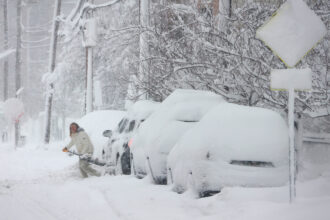As nations grapple with how they can slash their emissions as part of the Paris climate agreement, some may use international credit schemes that were approved in the treaty process. A new report from the European Commission casts serious doubts about such credits, however, concluding that the vast majority of them likely fail to actually reduce emissions.
The report, which was written last year but not published until this April, concludes that buying and selling emissions credits for overseas projects should be limited to a select list that meet rigorous standards, and used only as part of a transition to more effective policies for mitigating greenhouse gas emissions.
“Given the inherent shortcomings of crediting mechanisms, we recommend focusing climate mitigation efforts on forms of carbon pricing that do not rely extensively on credits,” the report said, adding that credits should play only a limited role after 2020.
“It’s a confirmation that offsetting is fundamentally problematic,” said Aki Kachi, international policy director for Carbon Market Watch, an advocacy group in Brussels.
The study examined the Clean Development Mechanism, created under the Kyoto Protocol to allow countries to offset emissions by purchasing credits linked to green-energy projects on an international market. The system allows a power plant in Germany, for example, to buy credits for the emissions savings from a wind farm in India.
The problem, the report says, is that the Indian wind farm likely would have been built anyway, even without the credits purchased by the Germans. In emissions-trading lingo, the reduction would be considered not “additional.”
“Overall, our results suggest that 85 percent of the projects covered in this analysis and 73 percent of the potential 2013-2020 Certified Emissions Reduction (CER) supply have a low likelihood that emission reductions are additional and are not over-estimated,” said the report, which was prepared by the Öko-Institut e.V., a German research group. “Only 2 percent of the projects and 7 percent of potential CER supply have a high likelihood of ensuring that emission reductions are additional and are not over-estimated.”
In short, the vast majority of credits are unlikely to actually reduce emissions. And while the report examined the Clean Development Mechanism specifically, it said that many of the problems are inherent to emissions crediting schemes, and that the lessons learned would likely apply elsewhere.
Carbon offset credits were included as part of the Kyoto Protocol, but have fallen out of favor after scandals in Europe and poor performance, Kachi said. Some countries now decline to use them and the European Union plans to prohibit international trading after 2020.
The Paris Agreement left the door open on emissions trading, but it left the details undefined, Kachi said.
“Two years later we’re supposed to have more detailed rules for how these things will work under the Paris Agreement, but there’s been no progress,” he said. “It’s a controversial issue that the world definitely has found no consensus over.”
About This Story
Perhaps you noticed: This story, like all the news we publish, is free to read. That’s because Inside Climate News is a 501c3 nonprofit organization. We do not charge a subscription fee, lock our news behind a paywall, or clutter our website with ads. We make our news on climate and the environment freely available to you and anyone who wants it.
That’s not all. We also share our news for free with scores of other media organizations around the country. Many of them can’t afford to do environmental journalism of their own. We’ve built bureaus from coast to coast to report local stories, collaborate with local newsrooms and co-publish articles so that this vital work is shared as widely as possible.
Two of us launched ICN in 2007. Six years later we earned a Pulitzer Prize for National Reporting, and now we run the oldest and largest dedicated climate newsroom in the nation. We tell the story in all its complexity. We hold polluters accountable. We expose environmental injustice. We debunk misinformation. We scrutinize solutions and inspire action.
Donations from readers like you fund every aspect of what we do. If you don’t already, will you support our ongoing work, our reporting on the biggest crisis facing our planet, and help us reach even more readers in more places?
Please take a moment to make a tax-deductible donation. Every one of them makes a difference.
Thank you,














